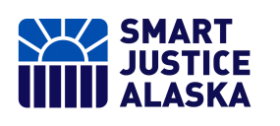COVID-19 and Your Rights
At the ACLU of Alaska, we're listening to health experts, while working to safeguard your civil rights and liberties. The spread of COVID-19 is a crisis, and we understand it will take many of us working together to respond to this pandemic appropriately, effectively, and fairly. We are actively monitoring how the response to COVID-19 may impact your civil liberties, we know the future of our democracy depends on it.
We're providing guidance to our elected officials on crafting a response that protects the populations most vulnerable to harm, including working people, incarcerated individuals and others interacting with the criminal legal system, homeless, immigrants and those with disabilities. Here you'll stay up to date on the ACLU of Alaska's response to COVID-19, including news updates, guidelines, letters to public officials, as well as hotlines to report civil rights and liberty problems and/or concerns related to coronavirus.
What we believe
- Any coronavirus response should be grounded in science and public health, and not be politicized
- Any response plan must protect the health, safety, and civil liberties of all in the least restrictive way available
- Public officials should act in alignment with public health guidance
- State leaders should encourage voluntary compliance with self-isolation measures as much as possible
- Leaders should pay particular attention to the most vulnerable people in our society
- Restrictions on liberty must continually be re-evaluated to ensure they remain justified in light of scientific evidence as conditions evolve
- Individuals should not have due process rights revoked for mandatory medical procedures, isolation or quarantine
Share your concerns
Has the response to COVID-19 impacted your civil rights and liberties? Do you know someone in custody at a jail or prison in Alaska with problems or concerns to safety, health, and civil liberties? Are you concerned about workplace conditions? Share them with us by emailing [email protected].
For polling access issues or concerns, email [email protected] or call 907-263-2010.
Using the drop-down list below, you can learn more about your rights during COVID-19. "We the people" means all of us.
Documents
- ACLU-AK COVID-19 Criminal Justice Response 2020-3-18.pdf
- 2020-3-20 ACLU-AK Testimony on Mayor's Emergency Powers AO 2020-34S.pdf
- 2020-3-20 ACLU-AK Testimony re AO 2020-33.pdf
- ACLU-AK COVID-19 letter to DOC 2020-4-14.pdf
- ACLU-AK to Dunleavy Admin re COVID-19 racial data 2020-4-20.pdf
- ACLU of Alaska Records Request FOIA.pdf
- ACLU-AK COVID-19 Remote Learning 2020-5-4.pdf
Related Content

ACLU of Alaska Finds Rapid Relief Needed to Reduce COVID-19 Risk in Dangerously Overcrowded, Understaffed Prisons Announces New Hotline to Report Conditions

ACLU of Alaska implements new work strategy, monitoring COVID-19 impacts

ACLU of Alaska urges Anchorage officials to protect civil liberties during COVID-19 response

